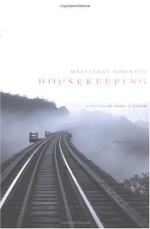|
This section contains 249 words (approx. 1 page at 300 words per page) |

|
Marilynne Robinson has written a first novel that one reads as slowly as poetry—and for the same reason: The language is so precise, so distilled, so beautiful that one doesn't want to 
What sustains the lyricism of "Housekeeping" is the immovable melancholy of its narrator, a quiet dreamy girl named Ruth who becomes so used to loss so young that she cannot envision clinging to anything more permanent than a moment, a memory or a dream. (p. 14)
The controlled lyricism of Ruth's language, which had been anchored in sensuous detail, becomes unmoored [as tension mounts and the novel nears its end]…. Since Ruth is our narrator, when her imagination becomes fevered and hallucinatory, so does the...
|
This section contains 249 words (approx. 1 page at 300 words per page) |

|


